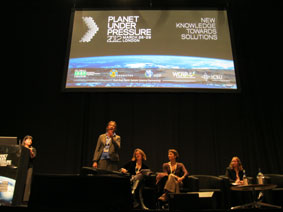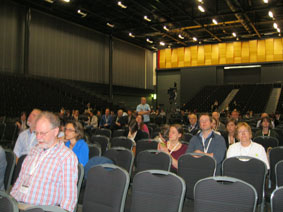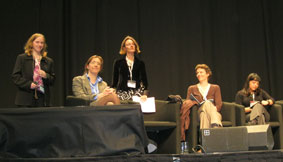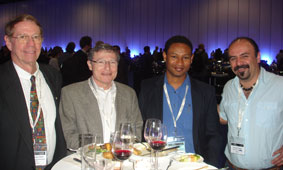
Newsletter of the
INTERNATIONAL ENVIRONMENT FORUM
Volume 14, Number 4 --- 15 April 2012
Website: iefworld.org
Article submission: newsletter@iefworld.org
Deadline next issue 13 May 2012
Secretariat Email: ief@iefworld.org General Secretary Emily Firth
Postal address: 12B Chemin de Maisonneuve, CH-1219 Chatelaine, Geneva, Switzerland
Download the pdf version
From the Editor, Request for information for upcoming newsletters
This newsletter is an opportunity for IEF members to share their experiences, activities, and initiatives that are taking place at the community level on climate change action. All members are welcome to contribute information about related activities, upcoming conferences, news from like-minded organizations, recommended websites, book reviews, etc. Please send information to newsletter@ief.org.
Please share the Leaves newsletter and IEF membership information with family, friends and associates, and encourage interested persons to consider becoming a member of the IEF.
Invitation to Global Ethics Forum, Geneva, 28-30 June 2012
Seeds for Successful Transformation 2012: The Value of Values in Responsible Business
International Conference Centre CICG – Geneva, Switzerland
The invitation below has been extended to members and friends of the International Environment Forum, through our partnership with the Global Ethics Forum.
“So many meetings are international but not global. The Global Ethics Forum is global.”
Professor Dr Deon Rossouw, Ethics Institute of South Africa
On behalf of our partner Globethics.net we are pleased to invite you to register to take part in the
Global Ethics Forum
28 to 30 June 2012
International Conference Centre CICG – Geneva
The Global Ethics Forum project organized by Globethics.net aims at providing a platform for dialogue and leadership as well as for action to the private sector and to all stakeholders on issues related to ethics and sustainable development in all sectors worldwide.
Following the Rio+20 Conference on Sustainable Development in Rio de Janeiro, the Global Ethics Forum 2012 will focus on the value of values as seeds for ethical transformation in politics, business, and society towards a sustainable future. The updated programme of the Forum is available on the Globethics.net site at http://www.globethics.net/web/gef/programme1.
Seeds for Successful Transformation 2012:
The Value of Values in Responsible Business
Register now for the Global Ethics Forum
http://www.globethics.net/web/gef/registration-form
5 REASONS TO REGISTER
1- Meet international and contextual speakers
Over 70 speakers - business leaders, practitioners, academics, and international experts, are going to share their vision and their best practices. The Forum’s participants will benefit from the informed forward-looking analysis of the current state of the World by two international Co-chairs who join Ambassador Walter Fust, President of Globethics.net and Co-chair of the Global Ethics Forum: Judge Mervyn King, Chairman of the International Integrated Reporting Committee (IIRC), author of the King Code on Corporate Governance for South Africa and the Commonwealth, and Mr. S.D. Shibulal, CEO and Co-founder of Infosys Technologies, one of the largest Indian IT Companies, whose exceptional careers and powerful leadership are rooted in a strong commitment to the value of ethics.
2- Participate in the interactive conference programme:
Keynote Speakers in plenary sessions: on ethical transformation of politics, business and society
Interview panels: 4 webcasted Interview Cases IC1-IC4 (28th June) offer unique opportunity, particularly for representatives of companies from all sectors and size, to benefit from the practical experience of companies in Switzerland, Russia, Turkey, Asia, West and Central Africa, Europe and around the world. Participants will learn from real companies about their practical experience in CSR and ethical practices, lessons-learned, future directions and know-how on ways in which the conceptual values related to ethics and corporate responsibility can be translated into business success and viable economic, social and environmental achievements.
12 workshops on successful ethical business decisions, best practices and practical tools – BELOW YOU CAN IDENTIFY the SPECIFIC WORKSHOPS that match your professional profile and interests and offer you maximum value and benefits:
Company representatives from CSR, Compliance and Law Departments, experts and researchers in business law, as well as representatives of the public, academic and civil society sectors dealing with conflicting legal cultures in different legal environments, will benefit from:
· Workshop A2: Solutions for Ethical Dilemmas in Business (28th June), proposing ethical guidelines for addressing ethical dilemmas and business opportunities in compliance with international and legal frameworks and standards.
· Workshop A4: Business Ethics in Conflicting Legal and Ethical Systems (28th June), offering practical approaches and business principles for dealing with and complying with different and often conflicting legal systems, perceptions and concepts of CSR and business ethics.
Representatives of Human Resources Departments are welcomed to attend Workshop A1: Multicultural Staff Recruitment and Staff Management (June 28th) addressing the need for practical ethical guidelines for ethical staff recruitment in multicultural context, based on the latest trends and tested innovative models.
Representatives of CSR, Strategy, Communications and Public Relations Departments in companies, as well as representatives of the academic, public and civil society sectors will benefit from learning about the latest developments and trends in GRI reporting at Workshop B4: Lessons from Transparency Initiatives in the Extractive Industries (29th June), presented by the GRI Secretariat and companies from the extractive industry.
Participants from the private sector, governments, NGOs, academic partners, think tanks and international organizations are welcomed to learn the latest trends and contribute with ideas to:
· Workshop B1: Global Finance Towards and New Global Reference Currency, Workshop B2: Sustainable Finance – A New Understanding of Time Horizons, and Workshop B3: Transparent Finance – Transparency in religious Organizations and NGOs, taking place on 29th June, focused on different innovative solutions and approaches to systemic changes in the transformation towards sustainable, transparent and ethical finance.
· Workshop C2: Business Schools with a new Paradigm of Sustainable Global Responsibility (29th June), on planning practical action steps in development of new models for business education and research that incorporate the ethical and sustainability values and address the sustainability challenges and opportunities of today and tomorrow.
· Workshop C1: Social Media for Transformation and Peace (29th June), focused on media ethics and social responsibility, the use of social media and networks in different cultures and bringing recommendations for ethically responsible and peace building social media.
· Workshop A3: Corporate Social Responsibility in Francophone Africa (in French, translation, 28th June), and Workshop C3: New Business Ethics Networks in Emerging Countries (29th June), focusing on the existing and emerging models, challenges, opportunities, and practical steps in facilitating networking on ethics between the different stakeholders interested in applied ethics and corporate responsibility.
· Workshop C4: Globethics.net Directories and Libraries for Networking (29th June), offers an introduction to Globethics.net internet-based networking platform, directories, library, and tools and a detailed presentation of the Business Ethics Experts directory and the Business Ethics Collection. Full programme: http://www.globethics.net/web/gef/programme1
3- Networking during events with the experts
Relaxed, open and friendly networking environment offers opportunities for person-to-person interaction with international experts from five continents.
4- Share with the partners of the Forum and promote your projects
Meet the diverse group of businesses and international organizations, partners and supporters of the Global Ethics Forum, involved in programmes of action and reflection on business ethics and CSR and promote your own projects and visions. Partner list: http://www.globethics.net/web/gef/partners
5- Implement conclusions in follow up projects and find partners for it
The Global Ethics Forum is more than just another conference. It is a three-year process (2011-2013) with rich opportunities for development, testing, and exchanging practical international and intercultural solutions through the projects defined during the 2011 and 2012 conferences with the participants.
REGISTER NOW FOR THE GLOBAL ETHICS FORUM 2012
Register soon at http://www.globethics.net/web/gef/registration-form and book your hotel in Geneva
Important dates to remember in 2012
11 May - early bird registrations – the registration fees go up after this date!
15 June - deadline for registrations
28 to 29 June - Conference 2012 at the International Conference Centre Geneva
30 June - Follow-up workshops
Please get in touch with the Forum team at globalethicsforum@globethics.net for all questions related to the Forum.
We look forward to welcoming you to the Global Ethics Forum 2012 conference in Geneva at the end of June.
Christoph Stückelberger and Teodorina Lessidrenska
Prof. Dr. Christoph Stueckelberger
Executive Director and Founder Globethics.net
Geneva, Switzerland
Office: +41 22 791 60 43
Mobile: +41 79 419 68 12
Skype: christoph.stueckelberger
Email: stueckelberger@globethics.net
Website: http://www.globethics.net
http://www.christophstueckelberger.ch
Dr. Teodorina Lessidrenska
Programme Executive Business Ethics, Globethics.net
Geneva, Switzerland
Tel.: +41 22 791 62 49
Mobile : +41 (0)7979 22452
Skype: teodorinalessidrenska
Email: lessidrenska@globethics.net
Website: www.globethics.net
U.S. National Baha'i community calls for climate change action during Earth Week
The national administrative body of the American Baha'i Community sent a third message on climate change in three years to all its members in March 2012 to raise awareness of the moral dimensions of this issue and to call for specific actions during Earth Week (22-29 April). It is collaborating with Interfaith Moral Action on Climate Change (http://www.interfaithactiononclimatechange.org/).
CLIMATE CHANGE IS A MORAL ISSUE
A Call for Interfaith Actions on Climate Change April 21-27
Washington, D.C. and Nationwide During Earth Week 2012
As people of faith and spirituality we are deeply concerned about the effects of climate change ravaging our planet, and we are compelled by our traditions and collective conscience to take action together on this deeply moral challenge.
Therefore, we call for interfaith actions across the USA during the week of April 21-27 to awaken our nation’s elected officials, as well as all civic and business leaders and households, to the urgent need for immediate and effective action to address the climate emergency.
As a first step, we call on our leaders to enact policies that dramatically reduce wasted energy and significantly shift our power supplies from oil, coal and natural gas to wind, solar, geothermal and other renewable energy sources. We must equitably phaseout all fossil fuel subsidies. We also call on our leaders to enact policies to help people here and abroad prepare for and withstand the terrible impacts of climate change that are already occurring and that will grow much worse in the years ahead.
We are compelled to heed Martin Luther King Jr’s call to appreciate the “fierce urgency of now” and his warning that “in this unfolding conundrum of life and history there is such a thing as being too late.”
Our Call is: To do justice, and to love kindness, and to walk humbly with your God (Micah 6:8). We must hold forth a brighter vision for our human future within the community of creation as we seek commitment to a set of clear, widely held moral principles.
First, it is morally wrong to unjustifiably cause human suffering and death. Human-induced climate change is correlated with storms, floods, droughts, crop failures, diseases, and water and food shortages, as well as associated breakdowns in political, economic, social and ecological systems. These breakdowns compromise human security and are already harming and killing people here and abroad. The greatest impacts are falling on low-income people, communities of color, Indigenous peoples, and others who have contributed little to climate change. We have a moral obligation to rapidly reduce our carbon pollution to minimize these disproportionate impacts.
The second principle is to honor our moral obligation for equity and justice. The shift to a sustainable, energy efficient and renewable energy economy can create millions of good jobs and support healthy families and communities. We must ensure that this shift is a ‘just transition’ that protects the most vulnerable among us and prepares all of us for the impacts of a changing climate. It should spread the investments in solutions and the benefits of new approaches equitably, enable whole industries to make the changes needed, provide adequate resources for workers and communities adversely affected by the shift, and ensure that all Americans have a democratic voice in how those decisions are made.
The third guiding moral principle is to protect the Earth, which is the source of all life. Virtually all the world’s religious and spiritual traditions proclaim that we have a moral obligation to be good stewards of the Earth and all of its creatures and processes. To disrupt the climate that is the cornerstone of all life and to squander the extraordinary abundance of life, diversity, and beauty of the planet is a moral failure of the first order.
Our capacity for repentance and forgiveness inspires hope in a future where we can recover from the errors of our past, repair the damage we have done and share in the act of healing the Earth. May we rely on the guidance of our faith traditions and spiritual teachings to find the power to act with courage and conviction to create a brighter, more secure and sustainable future for all of us, our children and all future generations.
Interfaith Moral Action on Climate: Washington, D.C., USA, 24 April 2012
Sunrise – 9:15 am Vigil • 8:30 am Interfaith Service with Bill McKibben, Ibrahim Ramey, Indigenous leaders, Luci Murphy
Martin Luther King, Jr. Memorial
10:30 am “Cry of the Earth: A Service for Healing the Climate”
with: Imam Johari Abdul-Malik, Dr. Carroll Baltimore, Sr. Simone Campbell/SSS, Rev. Richard Cizik, Rabbi Fred Scherlinder Dobb, Mohawk Clan Mother Louise McDonald, Rev. Lennox Yearwood, and others
NY Ave. Presbyterian Church,1313 New York Ave., NW
Bring some earth from your local community to be healed at the Service
12 noon Multi-faith Procession to the US Capitol
Upper Senate Park, 200 New Jersey Ave. NW, Wear religious garb if possible
1 pm Brown bag lunch for yourself and to share
1:30 pm Commissioning Vigil at the Capitol
2 – 4:30 pm Constituent Visits with Ethical Report Cards
meet with members in the House and Senate
4:30 – 6:00 pm Closing, Sharing & Benediction
Lutheran Church of the Reformation, 212 East Capitol St. (behind the Supreme Court)
People of faith and good will around the country who cannot join us on April 24 are urged to have vigils in their local communities.
http://www.interfaithactiononclimatechange.org/
Planet Under Pressure 2012
The global change research programmes of the International Council for Science (ICSU) organized a major science conference in London, England, on 26-29 March 2012 titled: Planet Under Pressure 2012: New Knowledge Towards Solutions. The conference aimed to provide scientific leadership towards the 2012 UN Conference on Sustainable Development - Rio+20. With nearly 3,000 participants, many significant plenary speakers, over 120 parallel sessions for paper presentations, 113 poster sessions, and many other events, the four days were rich in scientific exchanges, sharing of new knowledge and perspectives, and cross-disciplinary dialogues around the state of the planet and the role of science in moving towards sustainability. At least 3,000 more people participated in the conference online.

The ExCell International Conference Centre on the Thames in London, site of the
PUP Conference
IEF members took an active part in the conference, with IEF board member Sylvia Karlsson-Vinkuyzen of Wageningen University co-organizing a session with Johanna Alkan Olsson of Lund University on "Bridging the knowledge-action gap: the role of values for transforming lifestyles". This included papers on the values-based indicators project presented at the 14th IEF Conference in Brighton, UK, in 2010, including a keynote presentation by Gemma Burford and a contribution by Arthur Dahl on an "Ethical sustainability footprint for individual motivation". The research discussed went beyond identifying the knowledge-action gap and instead presented strategies and tools for how enable values to support the transition to sustainable lifestyles. The session was placed by the organizers in the main auditorium, and attracted over a hundred, with a dynamic discussion following the presentations, and considerable interest in the values-based indicators.
A press release
from the conference summarized the main points of the values session. Among the key
messages were:
 Values are multilayered in the sense that they are manifested within individuals and
groups and at the level of society as social norms. Values at these difference levels are
interrelated and may be contradictory.
Values are multilayered in the sense that they are manifested within individuals and
groups and at the level of society as social norms. Values at these difference levels are
interrelated and may be contradictory.
 Values have multiple sources, people draw on a diversity of sources for the values,
principles and social norms that inspire and guide them in their life choices. These
sources can include family, community, culture, societal discourse and faith.
Values have multiple sources, people draw on a diversity of sources for the values,
principles and social norms that inspire and guide them in their life choices. These
sources can include family, community, culture, societal discourse and faith.
 Values are not static, they are actively nurtured and reinforced through social and
cultural interaction, including education. Some are more easily changeable and others are
more deeply embedded in habits and social norms of a specific cultural context.
Values are not static, they are actively nurtured and reinforced through social and
cultural interaction, including education. Some are more easily changeable and others are
more deeply embedded in habits and social norms of a specific cultural context.
 The key strategy is one of stimulating (self-)reflection of values at several levels,
individual, collective, institutional.
The key strategy is one of stimulating (self-)reflection of values at several levels,
individual, collective, institutional.
There were several proposals for evaluation tools for reflecting on values at these
different levels: footprints (individual), indicators (group) and ethical deliberation
institutions. By using these tools a structured self-reflection can work as empowerment
for the ability to act.
 .
.  .
. 
The values-action gap session in the main auditorium; a small part of the audience; the speakers, including Gemma Burford (left) and co-chair Sylvia Karlsson-Vinkhuyzen (second from left)
In another session on "Challenges of integration", Sylvia and Arthur had a joint poster contribution on "Challenges in the Integration of Systems Knowledge for Governance of the Earth System".
Arthur gave a paper in a session on "Exploring effective architecture for emerging agencies in international environmental governance" on the topic "Design criteria and learning strategies for International Environmental Governance".
Following on from the contribution on migration that IEF has made earlier to the UN Human Rights Council Social Forum and the bureau of the UN Conference on Sustainable Development, Arthur also contributed to a session on "Governing global environmental change-induced migration across scales" with a paper on "Science, governance and ethics in environmental migration".

Arthur Dahl (left) with scientists from the USA, Cameroon and Mexico
The conference issued a State of the Planet Declaration that summarized the main points raised during the debates, and was supported by many important scientists and UN Secretary-General Ban Ki-moon.
Some of the main points raised in the declaration are:
1. Research now demonstrates that the continued functioning of the Earth system as it has
supported the well-being of human civilization in recent centuries is at risk. Without
urgent action, we could face threats to water, food, biodiversity and other critical
resources: these threats risk intensifying economic, ecological and social crises,
creating the potential for a humanitarian emergency on a global scale.
2. In one lifetime our increasingly interconnected and interdependent economic, social,
cultural and political systems have come to place pressures on the environment that may
cause fundamental changes in the Earth system and move us beyond safe natural boundaries.
But the same interconnectedness provides the potential for solutions: new ideas can form
and spread quickly, creating the momentum for the major transformation required for a
truly sustainable planet.
3. The defining challenge of our age is to safeguard Earth’s natural processes to
ensure the well-being of civilization while eradicating poverty, reducing conflict over
resources, and supporting human and ecosystem health.
4. As consumption accelerates everywhere and world population rises, it is no longer
sufficient to work towards a distant ideal of sustainable development. Global
sustainability must become a foundation of society. It can and must be part of the
bedrock of nation states and the fabric of societies.
A. NEW KNOWLEDGE
6. Humanity has taken a huge leap and become a planetary-scale force. Significant changes
have occurred since the 1950s, and the rate of change is accelerating. Researchers observe
unsafe levels of pollution, ecological change and resource demand, with potentially
catastrophic consequences for our global civilisation.
7. The past decade has seen the emergence of important areas of new scientific
understanding by which to define what we are witnessing:
A1. Humanity’s impact on the Earth system has become comparable to planetary-scale geological processes such as ice ages. Consensus is growing that we have driven the planet into a new epoch, the Anthropocene, in which many Earth-system processes and the living fabric of ecosystems are now dominated by human activities. That the Earth has experienced large-scale, abrupt changes in the past indicates that it could experience similar changes in the future. This recognition has led researchers to take the first step to identify planetary and regional thresholds and boundaries that, if crossed, could generate unacceptable environmental and social change.
A2. The Earth system is a complex, interconnected system that includes the global economy and society, which are themselves highly interconnected and interdependent. Such systems can confer remarkable stability and facilitate rapid innovation. But they are also susceptible to abrupt and rapid changes and crises, such as global financial meltdowns or the volatility of the global food system.
A3. Assessments of current mechanisms for governing global environmental change show why existing international arrangements are not dealing quickly enough with current global challenges such as climate change and biodiversity loss. There is growing evidence that diverse partnerships amongst local, national and regional governments as well as business and civil society provide essential safety nets should singular global policies fail – a polycentric approach for planetary stewardship.
8. These insights from recent research demand a new perception of responsibilities and accountabilities of nation states to support planetary stewardship. This requires goals aimed at global sustainability in order to achieve universal sustainable development. A crucial transformation is to move away from income as the key constituent of well-being and to develop new indicators that measure actual improvements in well-being at all scales. Equity in opportunities to improve well-being and eradication of poverty at the individual level will also play pivotal roles in the transition towards planetary stewardship.
B. NEW SOLUTIONS
9. Interconnected issues require interconnected solutions. Rapid scientific and
technological progress can provide potential solutions – if adopted in timely
manner – to reduce the risk of deleterious consequences for societies everywhere.
But technological innovation alone will not be enough. We can transform our values,
beliefs and aspirations towards sustainable prosperity.
10. Research plays a significant role in monitoring change, determining thresholds,
developing new technologies and processes, and providing solutions. The international
global-change research community proposes a new contract between science and society in
recognition that science must inform policy to make more wise and timely decisions and
that innovation should be informed by diverse local needs and conditions. This contract
needs to encompass three elements:
B1. Integrated goals for global sustainability based on scientific evidence are needed to provide essential targets for societies. In support of this, the international scientific community calls for a framework for regular global sustainability analyses that link existing assessments that build on the foundations of the Intergovernmental Panel on Climate Change, Intergovernmental Platform on Biodiversity and Ecosystem Services and other ongoing efforts. Such analyses can be designed to bring coherence to the science-policy interface.
B2. The challenges facing a planet under pressure demand a new approach to research that is more integrative, international and solutions-oriented. We need to link high-quality focused scientific research to new policy-relevant interdisciplinary efforts for global sustainability. This research must integrate across existing research programmes and disciplines, across all domains of research as well as local knowledge systems, across the North and South, and must be co-designed and implemented with input from governments, civil society, research funders, and the private sector. As part of this new collaboration, at this conference the global-environmental-change programmes support a major research initiative, Future Earth: research for global sustainability.
B3. New mechanisms to facilitate an interactive dialogue on global sustainability among the various stakeholders and the policy-making community at different scales. Such interactions should be designed to bring societal relevance and trust to science-policy interfaces, and more effectively inform decision-making to keep pace with rapid global change.
11. To these ends, the initiatives above must be supported by:
• A greater commitment to fund and support capacity-building in science and education globally, and particularly in developing countries.
• A strong commitment to both applied and pure research and increased efforts to bring together disciplines, across all research domains.
• Strengthened support for observing systems, particularly in developing countries, including the new observations needed to support decision-making for global sustainability. New approaches should fully integrate global observing systems for environmental and social issues.
• Continued exploration of new areas of knowledge, such as theoretical and applied research in behavioural science and economics addressing ecological and social tipping points and irreversibility at multiple levels.
C. NEW OPPORTUNITIES: SCIENCE IN SUPPORT OF RIO+20
12. The United Nations Rio+20 Conference is an opportunity the world must seize at this
crucial juncture. The UN Secretary-General’s Global Sustainability Panel report,
Resilient People, Resilient Planet, provides a strong strategic framework for a
sustainable future while calling for a marked strengthening of the interface between
science and policy. The findings of the Planet Under Pressure conference support the key
recommendations including:
C1. Fundamental reorientation and restructuring of national and international institutions is required to overcome barriers to progress and to move to effective Earthsystem governance. Governments must take action to support institutions and mechanisms that will improve coherence, as well as bring about integrated policy and action across the social, economic and environmental pillars. Current understanding supports the creation of a Sustainable Development Council within the UN system to integrate social, economic and environmental policy at the global level. There is also strong support for strengthening global governance by including civil society, business and industry in decision-making at all levels.
C2. A commitment to the proposal for universal Sustainable Development Goals is needed, as goals for Global Sustainability. These should be developed to take account of the synergies and trade-offs in and between areas such as food, water and energy security, maintenance of biodiversity and ecosystem services, sustainable urbanisation, social inclusion and livelihoods, protection of seas and oceans, and sustainable consumption and production. The research community should be involved in the development of goals, targets and indicators, recognising interconnected issues and building on existing measures of well-being. They should apply to all levels of governance.
C3. Recognition of the monetary and non-monetary values of public goods such as ecosystem services, education, health and global common resources such as the oceans and the atmosphere. These must be properly factored into management and decision-making frameworks at the national and sub-national levels to ensure that economic activities do not impose external costs on the global commons. Corrective measures that internalize costs and minimize the impacts on the commons need to be identified and implemented through regulatory and market-based mechanisms.
2012: A DEFINING MOMENT IN HISTORY
13. Our highly interconnected global society has the potential to innovate rapidly.
The Planet Under Pressure conference has taken advantage of this potential to explore new
pathways. It has marked a new direction for global change research. The international
scientific community must rapidly reorganize to focus on global sustainability solutions.
We must develop a new strategy for creating and rapidly translating knowledge into action,
which will form part of a new contract between science and society, with commitments from
both sides.
14. Society is taking substantial risks by delaying urgent and large-scale action. We must
show leadership at all levels. We must all play our parts. A strong contribution from all
stakeholders should make the UN’s Rio+20 conference a defining moment that sparks
global innovation to move us towards a sustainable future. We urge the world to grasp this
moment and make history.
Beyond Consumption: Pathways to Responsible Living
The Partnership for Education and research about Responsible Living (PERL) held its 2nd International Conference at the Technical University in Berlin, Germany, on 19-20 March 2012, on the theme "Beyond Consumption: Pathways to Responsible Living". The International Environment Forum is a partner in PERL and participated actively in the conference. Keynote speakers at the conference included Victoria Thoresen, PERL Project Coordinator (and IEF board member), speaking on "Concern, Compassion and Commitment: Keys to Responsible Living"; Tim Jackson, author of Prosperity Without Growth; Helen McCallum, Director General of Consumers International, and Jochen Flasbarth, President of the Federal Environment Agency, Germany. Sixty presentations were given, including one by IEF President Arthur Dahl on "Alternatives to the Consumer Society". Arthur also presented a poster on "Enabling Action at Rio+20". Both are available on the IEF web site. There were also panel discussions allowing a deeper exploration of the issues.
The conference explored the value-action gap between an understanding of the issues and action to change behaviour in response to the issue. Tim Jackson described consumption as a search for meaning, where people consume because of the hope for satisfaction in a product (even if short-lived) in a secular society resulting from the erosion of religious commitment. He said we should build a new economy that is fit for purpose and does not rely upon growth. He defined prosperity as the ability to flourish as human beings within ecological limits, connecting with what is truly human within us. The conference programme and abstracts are available on the PERL web site at http://www.perlprojects.org/Project-sites/PERL/PERL-International-Confe….
PERL now has 200 partners around the world, and is collaborating with IEF in plans for the United Nations Conference on Sustainable Development in Rio de Janeiro in June 2012. Victoria Thoresen is co-leading a thematic group on sustainable consumption and production in preparation for Rio+20. Sylvia Karlsson-Vinkhuyzen and Arthur Dahl have been active in the PERL working group organizing forward-looking expert think tanks to guide PERL's further development.
Updated 17 April 2012
|
